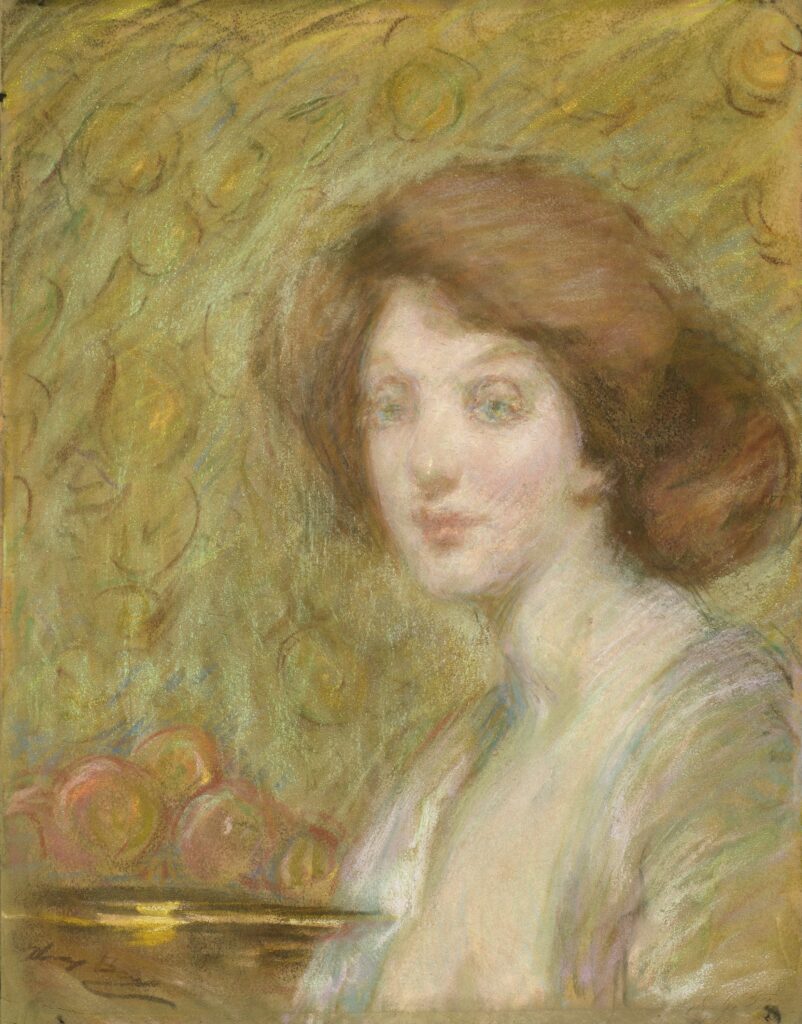Old Story of the Five Peaches
Author Unknown
Annotations by Josh Benjamin

and its Renwick Gallery, Washington, D.C.
A countryman brought home five peaches from the city, the most beautiful that could be seen.— His children saw the fruit for the first time. On this account they wondered, and were very much pleased over the beautiful peaches, with the rosy cheeks and soft down.
The father divided them among his four children, and one was received by the mother.
In the evening, as the children were going to their bedchambers, they were asked by their father:
“Well how did those fine peaches taste to you?”
“Excellent, dear father,” said the eldest. “It is a beautiful fruit, somewhat acid, and yet of so mild a flavor. I have saved the stone, and intend to rear a tree out of it.”
“Well done,” said the father; “that I call prudently providing for the future, as it becomes a husbandman.”[1]
“I have also eaten mine up,” said the youngest, “and thrown away the stone, and mother gave me the half of hers. Oh, it tasted so sweet, and melted in one’s mouth!”
“Well,” said the father, “to be sure, you have not acted prudently, but very naturally, as children are wont to do. For prudence there is still room enough in your life.”
Then began the second son:
“I picked up the stone which my little brother threw away, and cracked it. There was a little kernel therein that tasted as sweet as a nut. But my peach I sold, and I have received so much money for it that I can, when I go to the city, probably buy twelve.”
The father shook his head, and said,
“Wise it was, but not in the least childish or natural. May heaven preserve you from becoming a merchant!”
“And thou, Edmund?” said the father.
Candidly and openly answered Edmund:
“I took my peach to our neighbor’s son, the sick George, who has a fever. He was not willing to take it, but I laid it upon the bed and came away.”
“Well,” said the father, “who has, then, made the best use of his peach?”
Then cried they all three:
“Brother Edmund has.”
But Edmund remained silent, and the mother kissed him with tears in her eyes.
“OLd story of the five peaches.” The maine farmer 29, no. 48 (November 1861): 4.
[1] A “husbandman” is a farmer, or a person who cultivates land.
Contexts
Maine Farmer was a weekly newspaper published from 1844 to 1924. It included information for the population of white farming families, such as articles on livestock and crops, farming techniques, agricultural legislation, and sections designed for women and children that included poetry, stories, and homemaking tips. Children of white agricultural families at this time often worked on the farm, and according to 1870 U.S. Census data, fifteen percent of counted U.S. males age 10 to 15 worked as agricultural laborers, as did about two and a half percent of females of the same age. This did not include children who worked on small family farms, which were largely focused on subsistence farming, with any surplus limited to the local area. The official data is not an accurate reflection of women’s and girl’s contributions. Their household labor milking cows and tending hens, for example, often wasn’t enumerated.
Peaches do not grow particularly well in much of Maine, particularly in the colder north of the state, and colder temperatures in the 19th century would have made it more difficult. They may have been a luxury crop for the agricultural audience in Maine.
From the Maine Memory Network about the Wabanaki people, who were present in what is now called Maine long before European settlers arrived:
“Wabanaki means People of the Dawnland. As the first people to greet the sunrise, they are responsible for ‘holding up the sky.’
Wabanaki people, including the Maliseet, Micmac, Passamaquoddy, Penobscot, and Abenaki Nations, have inhabited what is now northern New England, the Canadian Maritimes, and Quebec, since time immemorial according to oral histories, and for at least 13,000 years according to the archaeological record.
Wabanakis are constantly adapting in response to dramatic changes in the environment. Their cultures also have changed over time, with the development of sophisticated political networks, evolving philosophies, and a deep understanding of the landscape.
For generations, Wabanaki people traveled seasonally, planting corn on the riverbanks in the spring, harvesting fish on the coast and gathering berries during the summer, and hunting game in the woods during wintertime. Their mobile lifestyle was prosperous, but radically changed with the coming of European settlers around 400 years ago, and later with the splitting of ancestral territory through the establishment of arbitrary international and state borders.”
Resources for Further Study
- Information about major indigenous populations of what would become Maine and eastern Canada.
- Another resource about the Wabanaki Nations of present-day Maine.
- Analysis of agriculture data in Maine from 1850 to 1997.
- Some historical context on peach growing in America.
Contemporary Connections
Some indigenous populations in Maine and other areas of New England, including some Wabanaki people, are dedicated to growing and maintaining heritage crops.